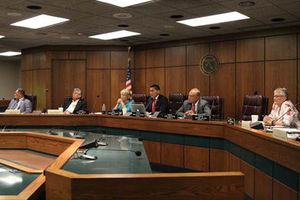
PHOENIX — A new state Senate committee made its debut July 15.
The Senate Ad-Hoc Committee on Indian Affairs is designed as a joint undertaking between the state and the tribes. State Sen. Carlyle Begay, D-Ganado, said he launched the committee as a way to foster crucial relationships and open communication between tribal leaders and state government.
“There are 22 tribal communities in Arizona, and it’s essential that we bridge the gap between the tribes and state government so we can work together on some of Arizona’s prominent issues, such as Indian gaming and water rights,” Begay said. “This committee seeks to improve communications and build a sense of trust between Arizona’s tribal citizens, communities and governments.”
Tribal issues often cut across party lines, so with this in mind, the committee was formed with Democrats, Republicans and tribal leaders as members to ensure balanced views and perspectives.
“I want to thank the state Senate for establishing the Senate Ad-Hoc Committee on Indian Affairs and including tribal leaders. Today our discussions centered on Indian education, and I am hopeful that this is a new era of collaboration between the state of Arizona and Indian tribes. This will not only provide education and awareness, but a joint partnership on improving relations between governments,” said San Carlos Apache Tribal Chairman Terry Rambler,
During the first meeting, the committee received reports from the Arizona Department of Education on the status of Native American education, on the activities of the ADE Native American Advisory Council and from the Arizona State Board for Charter Schools.
The committee also heard presentations regarding Native American Joint Technical Education District (JTED) program funding and the Indian School Bus Routes Maintenance Program. Representatives from the Goldwater Institute updated the committee on the status of the Indian Child Welfare Act lawsuit. Finally, the committee heard testimony from the public.
The next Senate Ad-Hoc Committee on Indian Affairs will be in August.
